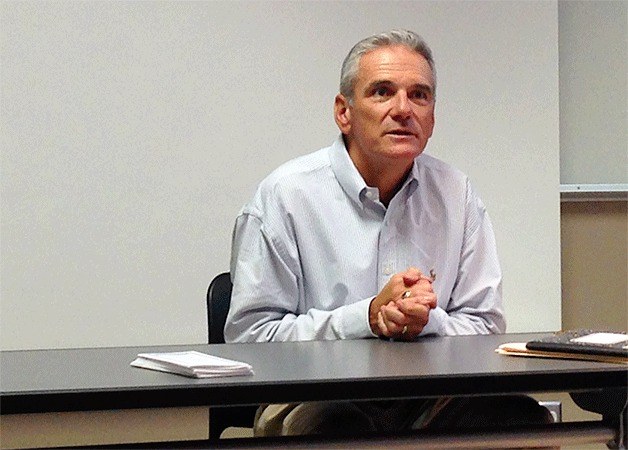For self-proclaimed “semi-retired” Army Col. Greg Stone, reading poetry is similar to a religious experience.
Stone said he doesn’t know how exactly poetry does it, but he knows it has an effect on him. Because Stone is a practicing Roman Catholic, he says he’s used to reading poetry in the form of hymns and psalms.
Stone says there is a connection between war and poetry, which he shares with local poet Linda Beeman, who has worked with Stone’s father.
Stone and Beeman gave a joint presentation at the Oak Harbor Library last week on understanding the effects war has on veterans and their loved ones.
Beeman, whose poems in her book “Collateral Damage” are inspired by having a loved one in Afghanistan, got the idea to invite Stone to her reading because he is the president of the Whidbey Veterans Resource Center.
“His is the larger story,” she said.
Stone spent 34 years in uniform, including in Bosnia during the negotiation of the Dayton Accords.
“As you step from the wear of a uniform back into this society … it’s not easy,” Stone said.
He says the mission of the resource center is to help veterans, their families and communities to understand the challenges of returning to civilian life.
The resource center, located in Bayview, has held four annual Stand Downs, a day organized by the volunteers at the center as a way to provide support and information in the form of clothing, housing, education, food and more.
During the last Stand Down, Stone estimates the center served 250 hamburgers and helped 40 veterans fill out paperwork for housing, education or work.
When it comes to his own experience being a veteran, Stone said he was blessed to not have experienced post-traumatic stress and says he worries more now because his children are in the military.
Stone has four children, all of whom have served in the military. It’s far easier to do it than watch, he said.
Beeman said she has a different perspective on war because she was not in the military, but she had a loved one serve in the Middle East.
During the presentation on Thursday, Beeman said she would sleep with her iPhone and keep it next to her in her bath, hoping for a call. She would have the radio on 24/7, listening for news from abroad.
Many of Beeman’s poems in “Collateral Damage” are influenced by articles from newspapers she read in 2012-2013, which are listed in the back of the book.
On her blog, Beeman asks if what the U.S. has accomplished is enough, if it’s worth it. “Were the countless heartbreaks of loss and estrangement worth that effort?”
On Thursday she said she has somewhat answered it.
“I think I’ve answered it to some extent in my mind,” Beeman said.
And she said her poetry is a way of understanding and letting out her emotions.
“For me, it’s catharsis,” she said.
It’s a way of cleansing and understanding emotions, Beeman said.
“In this case, it was quite a lot of pain,” she said.
Beeman’s poetry reflects that pain and the struggle to understand what people who have been in combat go through.
Before Beeman started writing poetry, she wrote and thought more linearly. And Stone says the same of when he was on active duty.
“It (poetry) lets you think more recklessly,” Beeman said.
While Beeman said she thinks of her poetry as dark, Stone doesn’t.
“I don’t view it as dark,” Stone said. “I view it as real.”
But Beeman said that war and poetry aren’t so different, especially when you remember that ancient Greek epic poems were about war.



